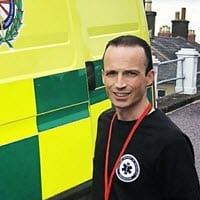New paramedicine and equity research projects
We are privileged to have recently welcomed Haydn Drake and Sarah Penney, who are undertaking their Masters research in our programme. Both Haydn and Sarah serve as busy paramedics and are accomplished academics.

Haydn (Kāi Tahu) has completed a Post Graduate Diploma in Paramedicine through Te Wānanga Aronui o Tāmaki Makau Rau (Auckland University of Technology) where he currently works as a lecturer within the Paramedicine Department of the Faculty of Health and Environment Sciences. Haydn also continues in clinical practice as a Critical Care Paramedic with Hato Hone St John.

Sarah has completed a Post Graduate Diploma in Public Health through Te Wānanga Aronui o Tāmaki Makau Rau (Auckland University of Technology) where she currently works as a lecturer within the Paramedicine Department of the Faculty of Health and Environment Sciences. Sarah also continues in clinical practice as an Emergency Medical Technician with Hato Hone St John.
Haydn is investigating Acute Coronary Syndrome in Māori and Pacific people in the prehospital setting: Demographics and access to hospital.
Māori and Pacific people are disproportionately affected by cardiovascular disease, and are less likely to go to the hospital by ambulance when experiencing a sudden potentially life-threatening heart attack. They can often have a delay between symptom onset and hospitalisation, and may go to their GP first or other accident and medical centre, thus delaying urgent ambulance transfer to hospital. Treatment can be time-critical, so unnecessary delay can result in more severe damage to the heart muscle and can ultimately impact survival itself. Studying the differences in the demographics of Māori and Pacific people experiencing a heart attack and their routes of admission to hospital will help identify areas for improvement in access to hospital care for this group of patients.
Sarah is exploring Cultural safety in paramedic practice: Experiences of Māori and whānau.
Māori experience significant inequities in health status and outcomes compared to non-Māori, including disproportionate exposure to and effects of cardiovascular disease. These inequities are significantly contributed to by bias, prejudice, and presumptions of practitioners. Despite literature in other disciplines highlighting inadequate experiences and poor-quality healthcare for Māori, negligible literature exists in the pre-hospital context. This study aims to explore experiences of (un)cultural safety in acute pre-hospital care by paramedics and to understand the effect of these experiences on perceptions of care for Māori and whānau. This research has the potential to create a new body of knowledge and make a significant contribution to paramedicine by enabling paramedics to better respond to the cultural needs of Māori.
We look forward to their findings!
Recent Comments